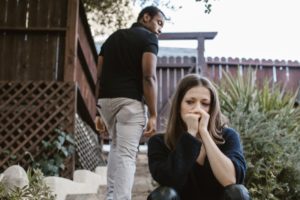Probably the scariest activity we could engage in is public speaking. People often rate this fear higher than the fear of death. It’s terrifying because it puts us in the position of being judged, found wanting, and then rejected.
One of the most basic human fears is the fear of rejection; the fear that what we think, say or do might be unacceptable to others; the fear that we’ll end up alone.
That’s why so few of us relish the thought of getting up and speaking in front of a group of people. What if one or more of them disagrees with us, is displeased with what we’re saying or tells us that we don’t know what we’re talking about?
When we’re putting our thoughts out there, whether in a post, a podcast, a talk or a lecture, or even just to one other person, there’s the always risk of being misunderstood, judged or rejected.
It can be so daunting that often, we’ll choose not to express ourselves; the fear of rejection makes it seem not worth the effort.
Human beings are communal animals. We thrive when we’re connected; when we feel a sense of belonging and interdependence.
We hate the idea of rejection because it plays on our primal fears of being alone and perhaps unable to fend for ourselves. Even the strongest, most independent person will often count on others for emotional and practical support.
It gets even more tricky when what we have to say goes against the norms. What if our point of view, our beliefs, our desires diverge from the status quo? It can be that much more challenging to speak our truth when the possibility of rejection looms large.
The paradox in all of this is that we can only feel like we belong when we’re being real. When we’re not fully honest about what we think, feel and need, we won’t connect with others on more than a superficial level. In order to belong, we have to be truly ourselves.
So, how can we speak out when others might not appreciate what we have to say? How can we have an authentic voice, given the possibility of rejection?
Caitlyn Jenner said in a recent interview that she finally went through with her transition when she could no longer live as anything but her true self. I imagine that the fear of rejection might have played a role in her having delayed her decision until the age of 65.
Not all of us are such public figures with the expectations of millions on our shoulders, but still, the fear of rejection can loom large in our minds.
Every time we don’t say what we really think, don’t express what we really feel, or don’t ask for what we really want, we’re avoiding the possibility of rejection.
Is there a way that we can overcome this fear and begin to feel more comfortable in expressing our truth, whether to an individual, a group or to the world? I think it comes down to taking responsibility for ourselves.
In order to be less concerned with rejection, we need to believe in ourselves and accept ourselves, so that if there are haters, they’ll have less of an effect on us. With self-acceptance, if we mess up, we can forgive ourselves and learn from our mistakes.
Still, we need to recognize that even the most confident person can feel hurt by unfair criticism. If we trust ourselves to take care of ourselves when others are overly critical or rejecting, it will be easier to speak our truth.
We can be confident enough to listen to constructive criticism, astute enough to tell when people are being hostile (and we need to get away from them) and self-compassionate, so that we don’t let our mistakes prevent us from speaking up in the future.
When we take responsibility for ourselves, rejection doesn’t have to be devastating, because we know that we’ll always be there for ourselves. And when we’re not in a panic about the possibility of rejection, it’s easier to put things in perspective.
We can see that there will always be people who are happy with us, just as we are, and that there will always be those who are OK with what we have to say. We can see that even if some people feel the need to reject us, it’s highly unlikely that everyone will.
Sign up here for my free biweekly wellness newsletter that brings you fresh, thought-provoking content.
Subscribe to my YouTube Channel to watch my series Moving into Autumn with Good Self-Care, where you’ll learn simple tips for taking the best care of yourself and your loved ones this fall season.
Tune in to my Ruthless Compassion Podcast where I go in-depth about topics like mental health, trauma, and loneliness.
And check out my book, “Women Decoded: The Secret Strategy for Relationship Success,” available on Amazon.com


